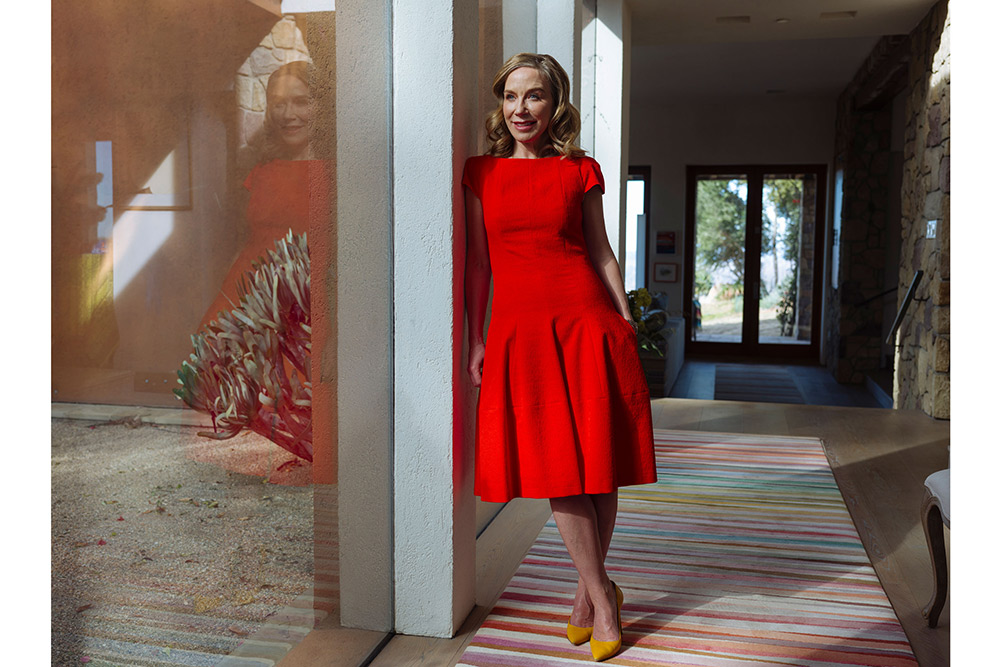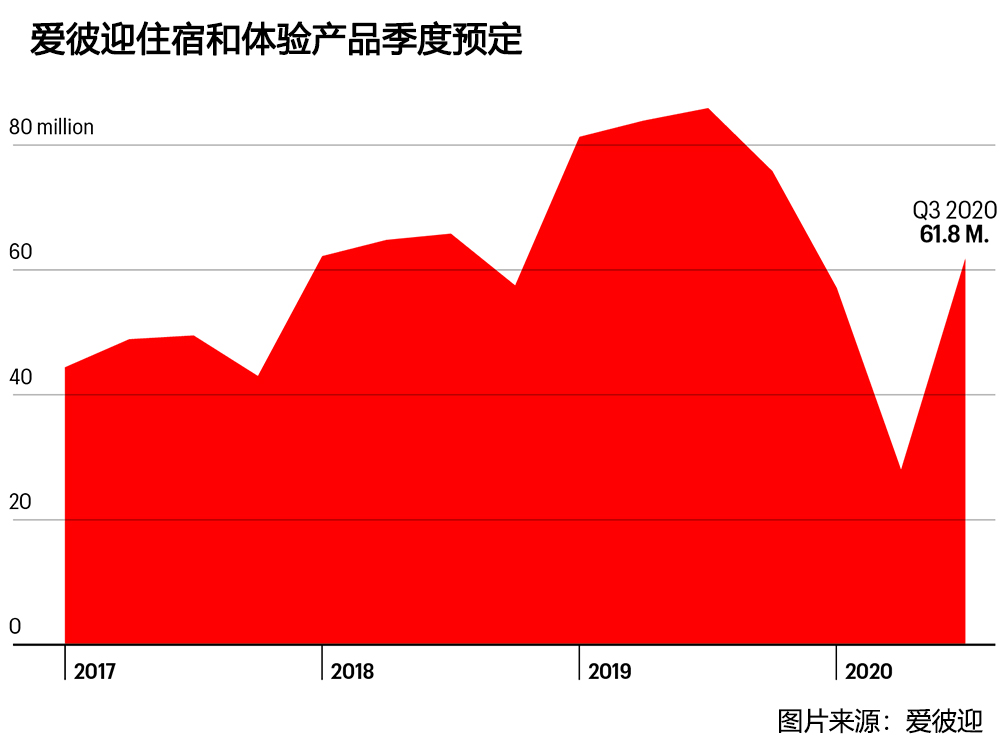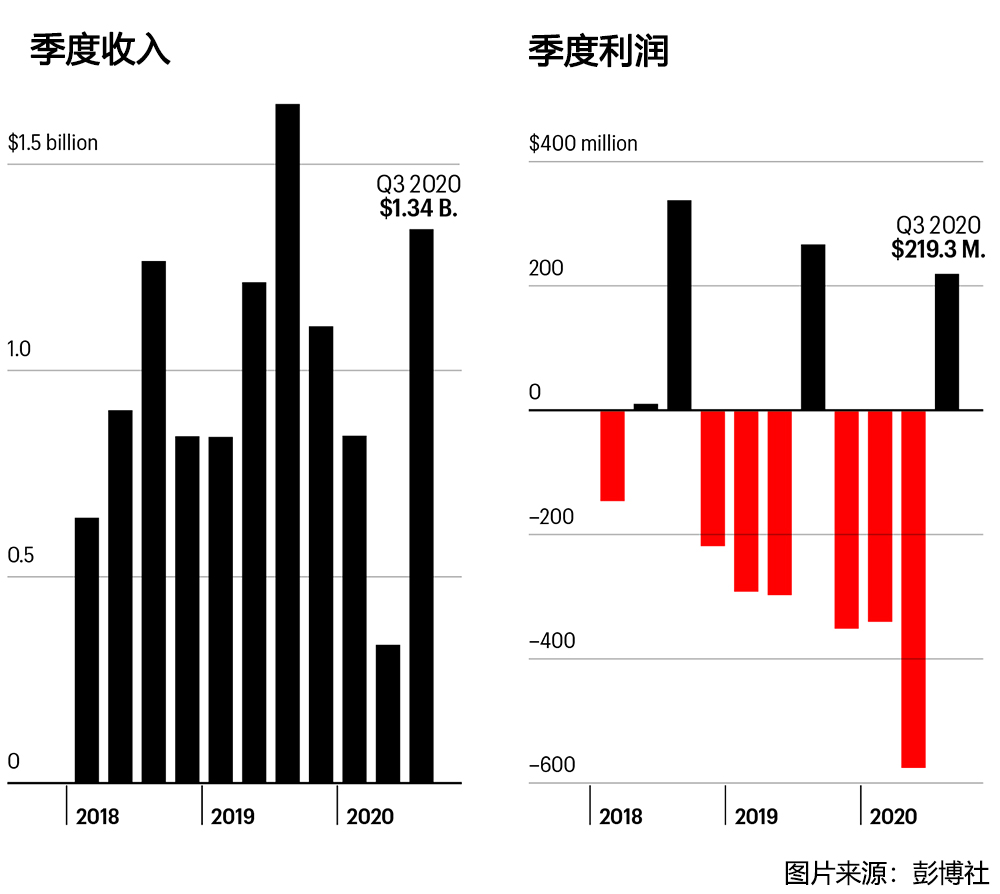1月初,一些愛彼迎房東也就是在平臺出租房屋的人們齊聚線上。本次視頻會議由愛彼迎托管業務主管凱瑟琳·鮑威爾組織,主要是討論疫情后的旅游市場。與會者顯然對當前的慘狀心有余悸。
其中一位是來自圣安東尼奧的房東,她談到會議市場放緩導致出租馬車公寓變得很困難。英國出生的鮑威爾在洛杉磯的家中同情地回應:“我們沒法‘變出’會議來,”她說,“但有沒有什么我們能幫忙的嗎?”
事實上,總部位于舊金山的愛彼迎也沒什么辦法遏制疫情。不過在過去幾個月里,公司一直在努力傾聽房東的聲音,關注他們的需求——用聯合創始人兼首席執行官布萊恩·切斯基的話說,這是回歸愛彼迎的“根”。具體想法是什么?那就是快樂的房東能讓房客也快樂,而且是很多房客。(不管是從房東還是房客身上,愛彼迎都能獲得收入。)

諷刺的是,這部分重啟工作均由新加入公司的鮑威爾領導。鮑威爾曾在迪士尼樂園擔任高管,2020年1月疫情開始在全球肆虐時剛剛在愛彼迎走馬上任。剛開始,她負責領導愛彼迎剛剛起步的“體驗”產品,房東可以提供例如在懷基基島與救援犬一起劃槳,在里斯本與“反串皇后”共同制作桑格里亞酒等項目。去年7月管理層改組后,鮑威爾承擔了新角色,主要是將愛彼迎的核心業務,即房源信息與新體驗相結合。“她承擔了巨大的責任,”愛彼迎三位聯合創始人之一喬·格比亞說。
不管是鮑威爾在愛彼迎首次亮相還是升職,都趕上了公司發展的關鍵時刻。去年春天,新冠疫情摧毀了需求,短短8周內業務下滑達80%。5月初,愛彼迎解雇了25%的員工,對2008年成立以來一直高速增長的公司來說這是非常清醒的一步。公司借了20億美元,還推遲了備受期待的上市進程。
隨后的12月初,愛彼迎終于進入公開市場,成為2020年最大規模的IPO。上市首日公司股價就翻了一番多,市值略超過1000億美元,超過了酒店巨頭萬豪、希爾頓和凱悅市值總合。雖然投資者在市場上追捧愛彼迎,公司本身還是難以持續盈利。去年截至9月,公司虧損增加了一倍多,達到近7億美元,銷售額則下降了32%至25億美元,都是疫情直接導致的后果。

預計短期內不會完全恢復。Stifel分析師斯考特·德威特稱,愛彼迎的租賃需求要到2023年才能恢復到疫情前水平。另一位Needham的分析師布拉德·埃里克森最近寫道,疫情可能成為“持續多年的逆風”,迫使公司在吸引客戶(包括房東和房客)方面投入更多資金,從而阻礙增長并拖累盈利。
鮑威爾的工作正是從此開始。她的任務是吸引新房東,并維持現有400多萬房東。這項任務并不容易。不過鮑威爾對大規模業務并不陌生。她在迪士尼曾領導全球12萬名“演員”,“演員”是迪士尼對主題公園員工的稱呼。“她的背景和技能都很完美,”蘋果前零售主管,愛彼迎董事會成員安吉拉?阿倫茨說。
鮑威爾入職愛彼迎的時間雖然不長,但一直努力幫房東發聲。
疫情爆發不久,她在接手新工作后不過幾周時就開始親自面對房東。1月初這場會議是她組織的第30場視頻聚會。(為了利用視頻會議時間,她還專門買了跑步機辦公桌,也算是疫情副產品。)她還幫助協助創建了理事會,方便房東參與愛彼迎的決策。

“她的本能之舉(直接跟房東談)跟我們早期管理公司的方式非常類似,”格比亞說,“之前我們走遍全美國見房東,舉辦活動聚會,跟他們談,想辦法把產品做好。”
現在格比亞和愛彼迎其他聯合創始人已經沒法親自去見每個房東,傾聽房東的需求也沒那么容易。如今,公司在全球10萬多個城市都有度假房源,幾乎每個國家都有人出租房間。但鮑威爾還是努力直接聽取房東的意見,然后據此制定實際政策和協議,包括實施她幫助設計的疫情期間五步清洗流程。“我學了很多關于消毒的知識,”她笑著說。
鮑威爾表示,最近禁止愛彼迎上架房源組織超過16人聚會的“派對禁令”也是跟房東對話的結果。此前不久,加州薩克拉門托一家愛彼迎度假出租酒店舉行了一場特殊派對,三人遭槍殺。“公司希望確保你們能掌控自己的房屋,在出問題之前就加以遏制,”去年8月鮑威爾在一段視頻中告訴房東們,“這意味著對派對和大群人更加嚴格。”
但是,對房東友好并不一定能獲得房客認可,確保雙方都樂意非常棘手。疫情來襲時,愛彼迎向最后一刻不得不取消預訂的房客提供退款,并稱退款是在公司“酌情處理”政策下進行的。很多房東抱怨收入損失,最終由公司彌補了部分損失。最近,隨著新一波疫情出現又引起新一波取消預訂,愛彼迎選擇支持房東。不管房東采取何種取消政策公司都支持,此舉激怒了一些房客。
這段插曲只是疫情期間愛彼迎匆忙應對緊急情況的新案例。“這是非常不確定的時期,”鮑威爾被問到公司必須做出艱難決定時說。可以肯定的是,愛彼迎確實處理了各種棘手的情況。不僅要跟加強監管短租的城市斗爭,還要在平臺上處理種族歧視事件,這還只是隨便列舉出的兩個公司不得不應對的復雜問題。
然而以上提到的問題還在疫情重創旅游業之前。愛彼迎首席執行官切斯基表示,即使一切恢復“正常”,人們的旅行習慣也會永久性改變,具體來說是商務旅行減少,探親訪友的個人旅行將增加。在鮑威爾看來,自己的工作是不管新現實什么樣,都要確保房東做好準備。“我不知道未來是什么樣,”鮑威爾說,“我工作的重心是幫助和激勵(房東)做好準備,從而滿足新需求。”
這也是為何鮑威爾最近率先推出在線控制面板,以方便房東隨時了解本地區的旅游趨勢。至于自己的度假計劃,她打算在能安全旅行后去英國見家人,“當然了,”她補充說,“也順便拜訪英國的房東們。”(財富中文網)
譯者:梁宇
審校:夏林
1月初,一些愛彼迎房東也就是在平臺出租房屋的人們齊聚線上。本次視頻會議由愛彼迎托管業務主管凱瑟琳·鮑威爾組織,主要是討論疫情后的旅游市場。與會者顯然對當前的慘狀心有余悸。
其中一位是來自圣安東尼奧的房東,她談到會議市場放緩導致出租馬車公寓變得很困難。英國出生的鮑威爾在洛杉磯的家中同情地回應:“我們沒法‘變出’會議來,”她說,“但有沒有什么我們能幫忙的嗎?”
事實上,總部位于舊金山的愛彼迎也沒什么辦法遏制疫情。不過在過去幾個月里,公司一直在努力傾聽房東的聲音,關注他們的需求——用聯合創始人兼首席執行官布萊恩·切斯基的話說,這是回歸愛彼迎的“根”。具體想法是什么?那就是快樂的房東能讓房客也快樂,而且是很多房客。(不管是從房東還是房客身上,愛彼迎都能獲得收入。)
諷刺的是,這部分重啟工作均由新加入公司的鮑威爾領導。鮑威爾曾在迪士尼樂園擔任高管,2020年1月疫情開始在全球肆虐時剛剛在愛彼迎走馬上任。剛開始,她負責領導愛彼迎剛剛起步的“體驗”產品,房東可以提供例如在懷基基島與救援犬一起劃槳,在里斯本與“反串皇后”共同制作桑格里亞酒等項目。去年7月管理層改組后,鮑威爾承擔了新角色,主要是將愛彼迎的核心業務,即房源信息與新體驗相結合。“她承擔了巨大的責任,”愛彼迎三位聯合創始人之一喬·格比亞說。
不管是鮑威爾在愛彼迎首次亮相還是升職,都趕上了公司發展的關鍵時刻。去年春天,新冠疫情摧毀了需求,短短8周內業務下滑達80%。5月初,愛彼迎解雇了25%的員工,對2008年成立以來一直高速增長的公司來說這是非常清醒的一步。公司借了20億美元,還推遲了備受期待的上市進程。
隨后的12月初,愛彼迎終于進入公開市場,成為2020年最大規模的IPO。上市首日公司股價就翻了一番多,市值略超過1000億美元,超過了酒店巨頭萬豪、希爾頓和凱悅市值總合。雖然投資者在市場上追捧愛彼迎,公司本身還是難以持續盈利。去年截至9月,公司虧損增加了一倍多,達到近7億美元,銷售額則下降了32%至25億美元,都是疫情直接導致的后果。
預計短期內不會完全恢復。Stifel分析師斯考特·德威特稱,愛彼迎的租賃需求要到2023年才能恢復到疫情前水平。另一位Needham的分析師布拉德·埃里克森最近寫道,疫情可能成為“持續多年的逆風”,迫使公司在吸引客戶(包括房東和房客)方面投入更多資金,從而阻礙增長并拖累盈利。
鮑威爾的工作正是從此開始。她的任務是吸引新房東,并維持現有400多萬房東。這項任務并不容易。不過鮑威爾對大規模業務并不陌生。她在迪士尼曾領導全球12萬名“演員”,“演員”是迪士尼對主題公園員工的稱呼。“她的背景和技能都很完美,”蘋果前零售主管,愛彼迎董事會成員安吉拉?阿倫茨說。
鮑威爾入職愛彼迎的時間雖然不長,但一直努力幫房東發聲。
疫情爆發不久,她在接手新工作后不過幾周時就開始親自面對房東。1月初這場會議是她組織的第30場視頻聚會。(為了利用視頻會議時間,她還專門買了跑步機辦公桌,也算是疫情副產品。)她還幫助協助創建了理事會,方便房東參與愛彼迎的決策。
“她的本能之舉(直接跟房東談)跟我們早期管理公司的方式非常類似,”格比亞說,“之前我們走遍全美國見房東,舉辦活動聚會,跟他們談,想辦法把產品做好。”
現在格比亞和愛彼迎其他聯合創始人已經沒法親自去見每個房東,傾聽房東的需求也沒那么容易。如今,公司在全球10萬多個城市都有度假房源,幾乎每個國家都有人出租房間。但鮑威爾還是努力直接聽取房東的意見,然后據此制定實際政策和協議,包括實施她幫助設計的疫情期間五步清洗流程。“我學了很多關于消毒的知識,”她笑著說。
鮑威爾表示,最近禁止愛彼迎上架房源組織超過16人聚會的“派對禁令”也是跟房東對話的結果。此前不久,加州薩克拉門托一家愛彼迎度假出租酒店舉行了一場特殊派對,三人遭槍殺。“公司希望確保你們能掌控自己的房屋,在出問題之前就加以遏制,”去年8月鮑威爾在一段視頻中告訴房東們,“這意味著對派對和大群人更加嚴格。”
但是,對房東友好并不一定能獲得房客認可,確保雙方都樂意非常棘手。疫情來襲時,愛彼迎向最后一刻不得不取消預訂的房客提供退款,并稱退款是在公司“酌情處理”政策下進行的。很多房東抱怨收入損失,最終由公司彌補了部分損失。最近,隨著新一波疫情出現又引起新一波取消預訂,愛彼迎選擇支持房東。不管房東采取何種取消政策公司都支持,此舉激怒了一些房客。
這段插曲只是疫情期間愛彼迎匆忙應對緊急情況的新案例。“這是非常不確定的時期,”鮑威爾被問到公司必須做出艱難決定時說。可以肯定的是,愛彼迎確實處理了各種棘手的情況。不僅要跟加強監管短租的城市斗爭,還要在平臺上處理種族歧視事件,這還只是隨便列舉出的兩個公司不得不應對的復雜問題。
然而以上提到的問題還在疫情重創旅游業之前。愛彼迎首席執行官切斯基表示,即使一切恢復“正常”,人們的旅行習慣也會永久性改變,具體來說是商務旅行減少,探親訪友的個人旅行將增加。在鮑威爾看來,自己的工作是不管新現實什么樣,都要確保房東做好準備。“我不知道未來是什么樣,”鮑威爾說,“我工作的重心是幫助和激勵(房東)做好準備,從而滿足新需求。”
這也是為何鮑威爾最近率先推出在線控制面板,以方便房東隨時了解本地區的旅游趨勢。至于自己的度假計劃,她打算在能安全旅行后去英國見家人,“當然了,”她補充說,“也順便拜訪英國的房東們。”(財富中文網)
譯者:梁宇
審校:夏林
In early January a handful of Airbnb hosts—the people who rent their homes on the vacation booking service—gathered online. The videoconference, organized by Catherine Powell, chief of Airbnb’s hosting business, was meant for discussing post-pandemic travel. But the attendees clearly had current events on their minds.
One, a woman from San Antonio, talked about how the slowdown in conventions was making it tough to rent out her carriage-house apartment. From her home in Los Angeles, the British-born Powell offered sympathetic responses: “We can’t ‘magic’ conventions,” she said. “But how can we help?”
Indeed, there’s not a lot Airbnb can do to wish away the pandemic. But over the past few months, the company has tried to listen to its hosts and to prioritize their needs—a return to Airbnb’s “roots,” in the words of cofounder and CEO Brian Chesky. The thinking? Happy hosts make for happy guests, and lots of them. (Airbnb gets a cut from both sides, hosts and guests.)
Ironically, much of this revival is led by Powell, a new addition to the San Francisco–based company. The longtime Disney theme parks executive was brought on board in January 2020, just as COVID-19 was starting to spread around the globe. Initially, she was tasked with heading Airbnb’s fledgling “experiences” product, which lets hosts offer tours like paddleboarding with rescue dogs in Waikiki and sangria-making with drag queens in Lisbon. But after a management shake-up in July, Powell was promoted to a new role that has combined Airbnb’s core business—home listings—with its newer experiences. “She’s assumed an immense amount of responsibility,” says Joe Gebbia, another of Airbnb’s three cofounders.
Powell’s debut at Airbnb, and her promotion, have come at a critical juncture in Airbnb’s trajectory. Last spring, COVID-19 demolished demand, causing an 80% drop in business in just eight weeks. In early May, Airbnb laid off 25% of its employees, a sobering step for a company that has been in hyper-growth mode since its founding in 2008. It also borrowed $2 billion and delayed a much-anticipated initial public offering.
Then, in early December, Airbnb finally made its public market debut—the biggest IPO of 2020. Airbnb shares more than doubled in the company’s first day of trading, valuing it at just over $100 billion—more than that of hotel giants Marriott, Hilton, and Hyatt combined. But even as investors clamor for a piece of Airbnb, it is still struggling to become consistently profitable. During the nine months ended in September, the company’s losses more than doubled to nearly $700 million, while sales tumbled 32% to $2.5 billion, a direct result of COVID-19.
A full recovery isn’t expected anytime soon. According to Stifel analyst Scott Devitt, demand for Airbnb rentals won’t return to pre-pandemic levels until 2023. Another analyst, Brad Erickson of Needham, recently wrote that COVID-19 could turn into a “multiyear headwind” that could force the company to spend more on attracting customers (both hosts and guests), hampering growth and delaying profitability.
That’s where Powell comes in. Her mandate: to reel in new hosts and to keep the more than 4 million existing ones. That’s no easy task. But Powell isn’t a stranger to scale. At Disney, she oversaw 120,000 global “cast members”—Disney-speak for theme park employees. “She’s got the perfect background and skills,” says Angela Ahrendts, Apple’s former retail chief and an Airbnb board member.
In her short time at Airbnb, Powell has tried to ensure that the voices of hosts are heard.
Shortly after the pandemic hit, just weeks into her new job, she started personally meeting with them—the gathering in early January was her 30th such get-together over video. (Another byproduct of the pandemic and all of the time she now spends in virtual meetings: Powell bought a treadmill desk.) She also helped create a board where hosts could weigh in on Airbnb’s decisions.
“Her instinct [to talk directly to hosts] is very commensurate and parallel to how we ran the company in the early days,” says Gebbia. “We would travel around the country to meet hosts, we would throw events and meetups to talk to them to figure out how to make the product better.”
Listening to hosts isn’t as easy as it used to be in the days when Gebbia and Airbnb’s other co-founders could actually meet and onboard each one in person. Today, the company has vacation listings in more than 100,000 cities worldwide, with people renting out their homes in almost every country. But Powell’s efforts to hear directly from hosts has led to real policies and protocols, including the implementation of a five-step COVID cleaning process she helped design. “I’ve learned a lot about sanitizing,” she says, laughing.
The company’s recent “party ban,” which prohibited gatherings of more than 16 people at Airbnb listings, was also a direct result of conversations with hosts, according to the exec. The ban came shortly after one particular party at an Airbnb vacation rental in Sacramento, Calif. ended up with three people being shot. “We want to make sure you have control over your space and that we help to stop problems before they start,” Powell told Airbnb's community of hosts in a video message last August. “That means being more strict on parties and large groups.”
But pleasing hosts doesn’t always equate with pleasing guests, and making sure that both are happy is a tricky business. When the pandemic hit, Airbnb provided refunds to guests who had to cancel their bookings at the last minute, saying the reimbursements were covered under the company’s “extenuating circumstances” policy. Many hosts complained about the lost income, and the company eventually covered some of those losses. More recently, as another COVID-19 surge caused a new wave of cancellations, Airbnb stood by its hosts. Whatever cancellation policy hosts had would still apply, a decision that angered some guests.
The episode is just one more example of how Airbnb has had to adapt on the fly during the pandemic. “It’s a very uncertain time,” Powell says when asked about the tough decisions the company has had to make. To be sure, Airbnb has dealt with all sorts of tricky situations in the past. Battling cities that are trying to more heavily regulate it, and addressing incidents of racial discrimination on its platform are just two examples of the types of complexities the company has already had to grapple with.
That was all before COVID-19 wreaked havoc on the travel industry. Even after things go back to “normal,” Airbnb CEO Chesky predicts people’s travel habits will be forever changed: There will be less business travel and more personal travel to visit family and friends. As for Powell, she sees it as her job to make sure that hosts are prepared, whatever the new reality. "I don't know what it's going to look like," says the exec. "But my focus is to help and inspire [our hosts] to be ready to meet those new needs."
That’s why Powell recently spearheaded an online dashboard that keeps hosts updated on travel trends in their regions. As for her own vacation plans, as soon as it’s safe to travel again, she intends to visit her family in the U.K. “And,” she adds, “visit our British hosts.”






